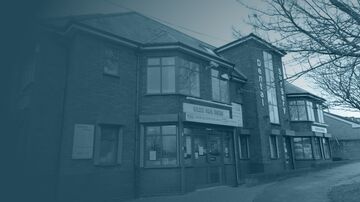
December 7, 2023
A Full Guide to Oral Health
Curious about how you can maintain excellent oral health? We share everything you need to know in this guide.
What does good oral health look like? In this guide, we’re going to explore the factors that contribute to good oral health, what you can do to maintain your oral health and the signs that something might be wrong.
If you have questions about your oral health and how to take better care of it, we recommend booking a routine checkup. This is a great opportunity to get a professional opinion on your oral health and ask questions about what you could do to improve.
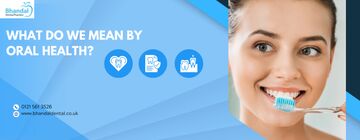
What do we mean by oral health?
Maintaining good oral health requires good habits. It’s not about something that you do once, but rather it is repeated habits that you do every day. To maintain good oral health, it’s recommended that you do the following:
Brush your teeth twice a day with a quality fluoride toothpaste
Floss at least once a day, or use interdental brushes for larger gaps
Visit the dentist 1-2 times per year for a checkup
Visit the dental hygienist 1-2 times per year for a professional cleaning
Enjoy sugary snacks and drinks as an occasional treat
Avoid snacking between meals
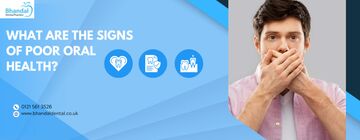
What are the signs of poor oral health?
Poor oral health can lead to a wide range of conditions. It can lead to issues with your teeth, gums, jaw and tongue. Some issues associated with poor oral health include:
Tooth decay. This can happen when bacteria build up on your teeth and attacks the enamel. As the enamel is worn away, bacteria can begin to erode the softer material below. If left untreated, tooth decay can reach the root of the tooth and lead to tooth loss. Tooth decay can be a very painful condition.
Gum disease. Plaque is a sticky substance that builds up on the surface of the teeth after we eat food. Poor brushing habits will allow this to harden into tartar. This provides a breeding ground for bacteria right alongside the gum line. This bacteria leads to inflammation of the gums which can then cause the gums to recede. The gums play an important role in stabilising the teeth, so the teeth are at increased risk of coming loose if the gums are impacted.
Bad breath. Bacteria in the mouth as a result of poor brushing habits can lead to bad breath. This can be situational, after eating certain types of food, or it can be linked to other oral health conditions such as dry mouth or gum disease.
Thinning enamel. Diet is often linked to thinning enamel, which can leave the tips of the teeth looking grey and more prone to chips and cracks. This is often linked to eating a diet high in acidic food such as fizzy drinks, sweets and fruit juices.
Tooth loss. There are many reasons that poor oral health can lead to tooth loss. The teeth can become loose due to gum disease or the teeth can become badly damaged by decay to the point where the only option is to extract them.
Blood when you brush. Often the first sign that something is amiss is seeing blood when you brush your teeth. If your gums bleed when you floss, this is not a reason to stop flossing – it’s actually a sign that you really need to floss.
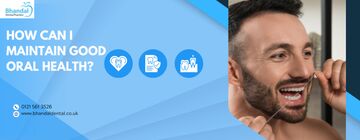
How can I maintain good oral health?
Awareness of the signs of poor oral health is a great place to start. Educating yourself about the impact of your everyday choices such as your diet and habits will also help you to maintain good oral health. For example, a simple way to safeguard your oral health is to avoid snacking between meals.
Other tips to maintain excellent oral health include:
Brush twice a day using an electric toothbrush. An electric toothbrush will be more effective and cover more of the tooth surface.
Never skip flossing. Flossing will help to reach the part of the tooth that your brush cannot reach. A large percentage of the tooth surface is hidden between the teeth, and this is also an ideal spot for food debris to accumulate.
Use interdental brushes for larger gaps. If flossing isn’t effective, you might need to use interdental brushes to help remove all traces of food and bacteria from between your teeth.
Avoid very acidic food and drink. This includes things like fizzy or sugary drinks, sweets, white wine and even fruit juice. These things should be enjoyed sparingly, and you should rinse with water afterwards so the acid doesn’t stay on your teeth.
Only trust your dentist with treatments like teeth whitening. These can help to improve the appearance of your teeth, but they can also cause permanent damage to your teeth or damage your gums if they are not handled correctly.
Try to avoid snacking between meals. When you eat a meal, your body produces saliva which helps to wash away bacteria and food debris. When you snack between meals, you don’t produce the same amount of saliva, so your teeth are not as well protected.
Visit the dentist at least once a year for a dental checkup. It might feel unnecessary if you think your teeth are generally healthy, but this can help your dentist catch issues early before they become more problematic.
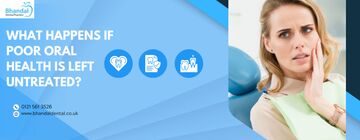
What happens if poor oral health is left untreated?
Poor oral health can have an impact on your wider health. If you lose teeth, this can impact your diet by making it more difficult to enjoy a wide range of foods. Long-term neglect of your oral health can also lead to oral cancer. It’s also more likely that these issues will go unchecked if you don’t visit the dentist regularly, so there is less chance of catching it early.
There is also the social embarrassment of poor oral hygiene. You might have bad breath, discoloured teeth or gaps in your smile that make it difficult for you to socialise. This can have an impact on all areas of your life, including social situations, relationships and job prospects.
Join the practice
We offer excellent care and advice regarding our wide range of treatments to all of our patients.
Contact our main practice
0121 561 3526Find your nearest practice
Related articles
You may also be interested in